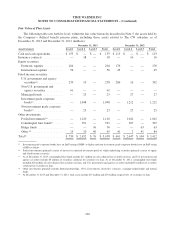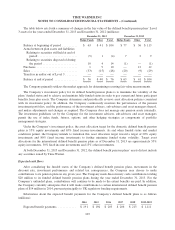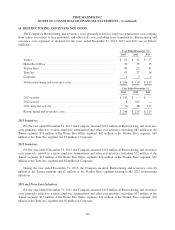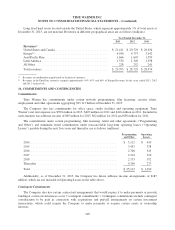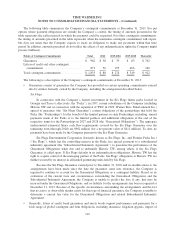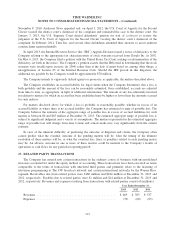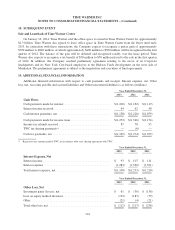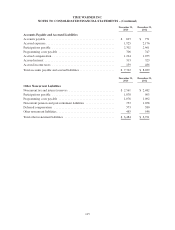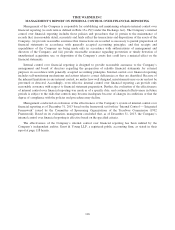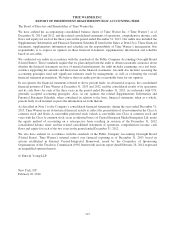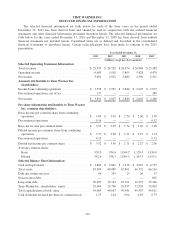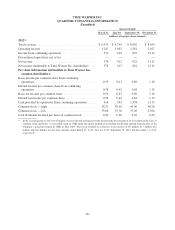Time Warner Cable 2013 Annual Report Download - page 128
Download and view the complete annual report
Please find page 128 of the 2013 Time Warner Cable annual report below. You can navigate through the pages in the report by either clicking on the pages listed below, or by using the keyword search tool below to find specific information within the annual report.TIME WARNER INC.
NOTES TO CONSOLIDATED FINANCIAL STATEMENTS – (Continued)
the sole creator of the character Superboy and, as such, DC Comics has had no right to create new Superboy
works since the alleged October 17, 2004 termination by plaintiffs of Siegel’s grants of rights to the Superboy
character to DC Comics’ predecessor-in-interest. This lawsuit seeks a declaration regarding the validity of the
alleged termination and an injunction against future use of the Superboy character. As described in the paragraph
above regarding the Superman lawsuit, by orders dated April 18, 2013 and June 18, 2013, the district court,
among other things, entered final judgment in DC Comics’ favor, ruling that the plaintiffs had transferred any
and all rights in the Superman and Superboy properties to DC Comics in 2001 pursuant to a binding settlement
agreement. On July 16, 2013, the plaintiffs filed a notice of appeal from the final judgment to the U.S. Court of
Appeals for the Ninth Circuit.
On May 14, 2010, DC Comics filed a related lawsuit in the U.S. District Court for the Central District of
California against the heirs of Superman co-creator Joseph Shuster, the Siegel heirs, their attorney Marc Toberoff
and certain companies that Mr. Toberoff controls. The lawsuit asserts a claim for declaratory relief concerning
the validity and scope of the copyright termination notice served by the Shuster heirs, which, together with the
termination notices served by the Siegel heirs described above, purports to preclude DC Comics from creating
new Superman and/or Superboy works for distribution and sale in the United States after October 26, 2013. The
lawsuit also asserts state law-based claims, including seeking declaratory relief with respect to, inter alia, the
validity of various agreements between Mr. Toberoff, his companies and the Shuster and Siegel heirs, and claims
for intentional interference by Mr. Toberoff with DC Comics’ contracts and prospective economic advantage
with the Shuster and Siegel heirs, for which DC Comics seeks monetary damages. On October 17, 2012, the
district court granted partial summary judgment in favor of DC Comics, holding that, among other things, the
copyright termination notice served by the Shuster heirs is invalid and the agreements referenced above
interfered with DC Comics’ rights under the copyright termination provisions. On April 4, 2013, the district court
granted summary judgment in favor of defendants on DC Comics’ state law intentional interference claims. On
November 21, 2013, the U.S. Court of Appeals for the Ninth Circuit affirmed the district court’s October 2012
decision. On January 21, 2014, the U.S. Court of Appeals for the Ninth Circuit denied defendants’ request for a
rehearing of the court’s November 2013 decision.
On April 4, 2007, the National Labor Relations Board (“NLRB”) issued a complaint against CNN America
Inc. (“CNN America”) and Team Video Services, LLC (“Team Video”). This administrative proceeding relates
to CNN America’s December 2003 and January 2004 terminations of its contractual relationships with Team
Video, under which Team Video had provided electronic newsgathering services in Washington, DC and New
York, NY. The National Association of Broadcast Employees and Technicians, under which Team Video’s
employees were unionized, initially filed charges of unfair labor practices with the NLRB in February 2004,
alleging that CNN America and Team Video were joint employers, that CNN America was a successor employer
to Team Video, and/or that CNN America discriminated in its hiring practices to avoid becoming a successor
employer or due to specific individuals’ union affiliation or activities. The NLRB complaint seeks, among other
things, the reinstatement of certain union members and monetary damages. On November 19, 2008, the presiding
NLRB Administrative Law Judge issued a non-binding recommended decision, finding CNN America liable. On
February 17, 2009, CNN America filed exceptions to this decision with the NLRB.
On March 10, 2009, Anderson News L.L.C. and Anderson Services L.L.C. (collectively, “Anderson News”)
filed an antitrust lawsuit in the U.S. District Court for the Southern District of New York against several
magazine publishers, distributors and wholesalers, including Time Inc. and one of its subsidiaries, Time/Warner
Retail Sales & Marketing, Inc. Plaintiffs allege that defendants violated Section 1 of the Sherman Antitrust Act
by engaging in an antitrust conspiracy against Anderson News, as well as other related state law claims.
Specifically, plaintiffs allege that defendants conspired to reduce competition in the wholesale market for single-
copy magazines by rejecting the magazine distribution surcharge proposed by Anderson News and another
magazine wholesaler and refusing to distribute magazines to them. Plaintiffs are seeking unspecified monetary
damages. On August 2, 2010, the court granted defendants’ motions to dismiss the complaint with prejudice and,
on October 25, 2010, the court denied Anderson News’ motion for reconsideration of that dismissal. On
112


